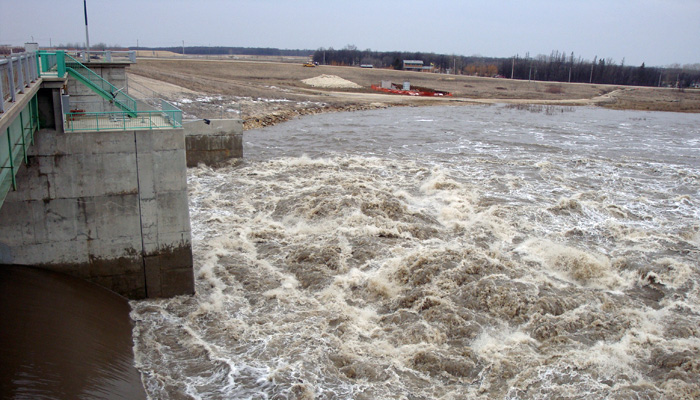The Manitoba Transportation and Infrastructure (MTI) Hydrologic Forecast Centre is monitoring another significant precipitation system that is expected to bring 20 to 50 millimetres (mm) of rain to much of southern and central Manitoba over three days, including yesterday. Some localized areas could receive higher amounts of precipitation with some weather models calling for as much as 80 mm of precipitation in a rain snow mix with thunderstorms.
Depending on the amount, location and intensity of the rainfall, flows and water levels in some areas of the province will be impacted. Forecasters are monitoring the system and will issue updates as required.
An overland flood warning is issued for much of western and southeastern Manitoba. Water levels on streams and drains, including those in the Parkland region, are high and soils are saturated. Heavy rains could result in overland flooding and potential for flash flooding, particularly for waterways that drain from higher elevations. Depending on the amount and intensity of rain, water levels could rise rapidly and threaten low-lying or nearby properties as well as road, crossing and other infrastructure.
The forecast precipitation is expected to affect the upper Assiniboine River basin in Saskatchewan and increase inflows into the Shellmouth Dam. The department continues to co-ordinate operations with stakeholders and advises further increases of outflow from the dam may be necessary, depending on the amount of rain received.
The forecast precipitation is also expected to affect the Whiteshell lakes area and the Winnipeg River basin. Very high flows and water levels are being experienced on the lakes and rivers in this area and the expected precipitation will cause them to rise further.
Road and crossing infrastructure in the Parkland region has been widely and severely affected by the run-off from last weekend’s precipitation, and motorists are asked to avoid the area where possible. Flash flooding caused overtopping of roads and damage to bridge and culvert crossings along several highways, provincial roads and many municipal roads.
MTI regional crews are deployed throughout the area to assess the full impact of the weather system and respond as required. Department staff are engaged in a significant effort to assess this damage, conduct immediate repairs and remediation where possible and plan for future repairs. Priority is being given to restoring vehicle access on critical highways and provincial roads in the area.
As many road closures are still in place, motorists who are not in the Parkland region are asked to avoid the area and those who are already in the area and are required to travel are strongly encouraged to plan their routes before travelling by checking manitoba511.ca or calling 511. Do not travel on closed or flooded roads.
The Manitoba Emergency Measures Organization (EMO) is working directly with municipalities in the impacted region to provide support and assistance. Flood resources, including sandbags, super sandbags and Tiger Tubes, have been provided to protect homes and critical infrastructure in the Parkland region including the rural municipalities of Lakeshore and McCreary, the municipalities of Ethelbert and Clanwilliam-Erikson and the Town of Minnedosa.
EMO is also working closing with Indigenous Services Canada (ISC) on First Nation response. Flood resources have been provided to the Northern Affairs communities of Duck Bay and Camperville, and Pine Creek First Nation.
Several communities throughout the province continue to be impacted by high water levels. EMO continues to work with all local authorities and emergency management partners to provide guidance and support for response and recovery activities. At this time, 39 states of local emergency have been declared. Manitoba EMO continues to work with Indigenous Services Canada (ISC) in supporting ISC-led response measures with First Nation communities.
Manitobans are reminded in the event of an emergency due to natural or human-caused emergencies, having a preparedness plan will help ensure the safety of their home and family. Heavy rains can lead to potentially dangerous situations including flash flooding and extreme overland flooding.
Residents in affected areas should take immediate action to protect individuals and property, and be prepared to evacuate if needed. Local authorities will have the most up-to-date information on accommodation options and evacuation routes. Households should prepare a 72-hour emergency kit. Manitobans should not attempt to cross fast-flowing waters or waters of unknown depth. Avoid affected water bodies, valleys, low-lying areas and flooded areas and follow all directions by local authorities.




